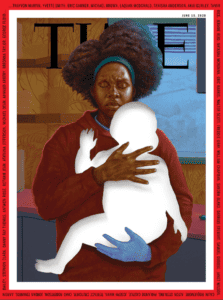The Lavin Agency Speakers Bureau
A speakers bureau that represents the best original thinkers,
writers, and doers for speaking engagements.
A speakers bureau that represents the best original thinkers,
writers, and doers for speaking engagements.
Art has the power to reframe our history—revealing the past we've lost and the future we're working towards.
Urgent and timely, TITUS KAPHAR’s artworks capture the spirit of social justice and change in America today (exemplified in his TIME cover portrait of the Ferguson protests). He was named a MacArthur “Genius” for “highlighting the lack of representation of people of color in the canon of Western art with works that deconstruct the literal and visual structure of the artwork.” His vital and moving talks expose the racism and inequality we take for granted, and reveal what we need to do to move forward.
“Art is a language. There is always a narrative coded in painting and sculpture. When you look at something, ask yourself, who is represented and who is invisible?”
— Titus Kaphar, The Atlantic
Art has the power to reframe our history. When you dislodge history from its status as the “past,” you unearth its contemporary relevance, says award-winning artist Titus Kaphar. Titus works with history—history writ large, as well as his own story, familial and personal—to offer a stirring portrait of the here and now. His body of work is diverse, in both form and substance, speaking to the most vital discussions happening around race, diversity, and reconciliation in the United States.
Titus’s debut feature film, Exhibiting Forgiveness, follows a Black artist on the path to success who receives an unexpected visit from his estranged father. It delves into trauma, resilience, and the power of art, and premiered at Sundance alongside works by titans like Steven Soderbergh. Exhibiting Forgiveness is “strikingly flawless” (RogerEbert.com) and “visually stunning” (Deadline). Variety calls it “a feel-the-reality movie, a drama willing to scald. That’s its quiet power.”
Titus collaborated with poet Reginald Dwayne Betts on The Redaction at MoMA PS1 (now a book of the same name). They unite their mediums to reveal the ways the legal system exploits and erases the poor and incarcerated from public consciousness, drawing inspiration from lawsuits filed by the Civil Rights Corps (CRC) on behalf of people incarcerated because of an inability to pay court fines and fees. Together, the voices of poet and artist blend with those of the plaintiffs and prosecutors, reclaiming these lost narratives.

As an engrossing keynote speaker, Titus exposes how all depictions, no matter how personal or grandiose, are always imperfect and capable of being remade. In recognition of his powerful vision, TIME magazine commissioned an artwork for their cover in response to the protests in Ferguson, Missouri—freezing in time an unforgettable moment of potential, protest, and civil rights upheaval. Titus explores the overwhelming volume of men trapped in our criminal justice system bearing his own father’s name in The Jerome Project. The mug shots of these “Jeromes,” all Black, are re-imagined as gilded, devotional subjects submerged in tar—signaling how much time they’ve lost in prison as well as a historical form of torture. Titus re-mixes the work of Classical and Renaissance painters in Drawing the Blinds, interrogating the history of aesthetics while revealing marginalized, forgotten figures.
“Shining a fierce, restorative light on those left in the shadow of history,”— The New York Times on NXTHVN
Titus’s arts incubator, NXTHVN, is a $12 million nonprofit center and fellowship program that nurtures rising talents. Titus also collaborated with For Freedoms’ 50 State Initiative, a cross-country art project promoting passion and participation in the democratic process. He also completed a sculptural commission for Princeton University Art Museum (to coincide with the opening of the Princeton and Slavery project). The sculpture has been strategically erected on the lawn of the MacLean House, where former university presidents lived and owned slaves.
Titus’s previous exhibitions include Unseen: Our Past in a New Light, Classical Disruption, Shifting Skies, 99 Jeromes, Beyond a Veil of Beauty, Reconstruction, and History in the Making, and more. He is the distinguished recipient of the Gwendolyn Knight and Jacob Lawrence Fellowship, as well as the Creative Capital Award and Rauschenberg Artist as Activist Fellowship. His work has been included in the collections of the Museum of Modern Art, the New Britain Museum of American Art, the Yale University Art Gallery, and the Brooklyn Museum, as well as in the Studio Museum in Harlem (where he was Artist in Residence), the Smithsonian National Portrait Gallery and the Seattle Art Museum. He received an MFA from the Yale School of Art and a BFA from San Jose State University.
Pulitzer Prize-Winning Author of On Juneteenth Harvard Law Professor MacArthur Genius
Cognitive Scientist Expert in the Fields of Language and Cognition
Director of The Muslims Are Coming! Author of How to Make White People Laugh

Founder of Street Symphony Co-Founder of the Skid Row Arts Alliance MacArthur Genius
Pulitzer Prize-Winning Author of On Juneteenth Harvard Law Professor MacArthur Genius

Pulitzer Prize-Winning Creator of The 1619 Project Executive Producer of the Emmy Award-Winning 1619 Project Hulu Docuseries MacArthur Genius

Instant New York Times Bestselling Author of The Story of Art Without Men 2021 Forbes 30 under 30 Europe Guardian Columnist Art Historian and Curator

Founder of Vision & Justice Harvard Associate Professor Author of The Rise and The Unseen Truth
Award-Winning Toy Designer of the World-Renowned Rigamajig Founder and Principal Designer at Toy Company Heroes Will Rise

Author of Grit, the #1 New York Times Bestseller | Pioneering Researcher on Grit, Perseverance, and the Science of Success

Pulitzer Prize-Winning Creator of The 1619 Project | Executive Producer of the Emmy Award-Winning 1619 Project Hulu Docuseries | MacArthur Genius
Nike's Former Chief Marketing Officer | Author of Emotion by Design

New York Times Bestselling Author Of All Boys Aren’t Blue and We Are Not Broken | Emmy Nominee | LGBTQIA+ Activist
CEO of The Atlantic | Former Editor-in-Chief of WIRED

Titus Kaphar left his father’s house when he was just fifteen. Twenty years later, after zero contact, his father reappeared, wanting to reconnect. Titus spent the next three days recording their conversations: asking questions, using the camera screen as a means of distance and objectivity. Later, when searching into his father’s past, he not only found his criminal record, but the records of 99 other men—all Black, and all bearing the exact same name. Born out of this frightening discovery was The Jerome Project: paintings, video art, sculptures, and even a growing initiative to help young people with family locked inside the criminal justice system.
But for Titus, this is not an isolated body of work; rather, it’s one he’s been struggling with his entire life. In this deeply personal keynote, he confronts the full complexity of the American judicial system—its inequalities, its raw enormity—through his own lived experiences. In so doing, he puts a human face to an all-too-American story (much like his own father’s particular story, and life, dovetails with the social history and myths of black criminality). In essence, and like any great artist, Titus brings immediacy to abstraction—making distant notions about equity and racial justice as familiar, and moving, as a portrait of someone we love.
If art is a language that speaks, what is it saying? In statue form, Roosevelt rides a horse and boldly stares into the future; meanwhile, nameless African American and Indigenous people walk on foot beside him. Statues of confederate soldiers loom over our civic institutions—our libraries and schools and offices—without context or apology. Who are the anonymous slaves, servants, and laborers appearing as footnotes in portraits of our Founding Fathers? What values are being expressed by the constitutional monuments dotting the American landscape? And why do we skip over chapters—entire peoples, entire histories—in our national narratives?
In this powerful talk, Titus Kaphar imagines a renewed, more nuanced engagement with American history: envisioning new spaces for marginalized or forgotten bodies to enter, and disrupt, the evolving fabric of our culture. For this creator, the artist’s role is clear: to draw back the curtain on ignorance and deception, and amplify the voices of those who cannot speak for themselves. In a simple phrase, it’s to celebrate the truth. Join Titus—one of the country’s most exciting young painters—on a revealing, intellectually nourishing tour of the issues most in need of amendment.